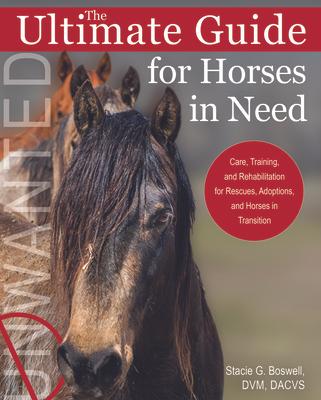A resource of astounding scope illustrating recommended management and retraining practices for horses and donkeys that have been ignored, neglected, abused, or starved.
Whether given a second chance through purchase, adoption, or rescue, the horse in the "wrong" situation should have a chance to find his way to the "right one." Veterinarian Dr. Stacie Boswell's goal is to restore health and comfort to every horse in transition, and to help him learn how to function as the horse he is expected to be―from the Thoroughbred off the track to the grade pony from the field down the road. In her unparalleled reference, Dr. Boswell explains:
- Where they come from: The origins of the unwanted, neglected, or abused horse.
- Travel and intake: Safety, regulations, identification, and quarantine.
- Nutrition, dentistry, and colic: Body Condition Scoring (BCS),
- Refeeding Syndrome, nutrition, long-term weight management, colic prevention and treatment, and dealing with gastric ulcers.
- Vaccination and parasite management: Deworming, identifying and treating skin conditions, viruses, and respiratory diseases.
- Hoof care, lameness, and wounds: Evaluating hoof structure and the horse's movement, trimming and shoeing, abscesses, laminitis, arthritis, and bandaging.
- Birth control: Castration and mare management.
- Foal rescue: The birthing process, working with orphans, halter training, and hoof handling.
- The "down" horse: Identifying and treating underlying problems, rolling a horse, bed sores, slings, and quality of life considerations.
- Working in disaster scenarios: Preparedness, identification, transportation, communication, and first aid.
- Euthanasia: Compassionate guidelines, procedures, and aftercare.
- Unique training considerations: Coming into work according to BCS.
- How horses sense and respond: Equine vision, training principles, and working with the fearful horse.
- Developing a relationship with your rescue: Social integration, developing trust, overcoming fear, handling feet and legs, halter training adult horses, preparing a horse for medical care, groundwork, and riding.
In Dr. Boswell has compiled hundreds of case studies highlighting the areas of concern in the horse "in need," and in these pages details proactive methods of handling common medical problems and health issues, from nutrition and dentistry to deworming and hoofcare to traumatic injury and emergency rescue scenarios. She explains the ways that, as a new horse is rehabilitated physically, specific training techniques can help him adapt to the positive changes in his care and environment.
In the United States alone, it is estimated that almost 150,000 horses per year are "unwanted." This number grows exponentially when you consider horses worldwide. Horses that are old, injured, sick, unmanageable, or fail to meet expectations deserve to be treated with dignity and given every chance for a comfortable life in the company of humans. Dr. Boswell's book helps make this possible.
